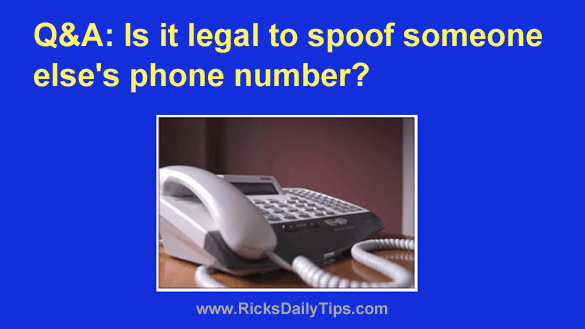Rick’s Tech Tips Newsletter
 Question from Brenda: I’m so frustrated with all the calls I’m receiving from scammers who have spoofed someone else’s phone number!
Question from Brenda: I’m so frustrated with all the calls I’m receiving from scammers who have spoofed someone else’s phone number!
I’ve always heard that’s illegal so why are so many people doing it?
So tell me, is spoofing illegal or not?
Rick’s answer: I know exactly what you mean, Brenda. It really is frustrating to answer a call only to find out that the caller isn’t the person whose name was displayed on the Caller ID screen.
A number of shady online services make it extremely easy to spoof a phone number and trick the recipient into thinking the call or text is from either someone they know personally or from a local business.
You’ said you’ve always thought that spoofing is against the law, but surprisingly, it isn’t. At least not on a federal level and as long as the call meets some specific criteria.
This passage from the Q&A’s section of the Spoofing and Caller ID page on the official FCC.gov website explains when spoofing is legal and when it isn’t:
“When is spoofing illegal??
Under the Truth in Caller ID Act, FCC rules prohibit anyone from transmitting misleading or inaccurate caller ID information with the intent to defraud, cause harm or wrongly obtain anything of value. Anyone who is illegally spoofing can face penalties of up to $10,000 for each violation. However, spoofing is not always illegal. There are legitimate, legal uses for spoofing, like when a doctor calls a patient from her personal mobile phone and displays the office number rather than the personal phone number or a business displays its toll-free call-back number.”
As the passage above clearly states, spoofing a phone number without the intent to harm or defraud the the recipient in some way is completely legal as long as no actual harm ends up being caused.
What’s more, while spoofing with the intention of harming the recipient in some way is indeed illegal, proving that harm was intended or actually took place can be difficult from a legal standpoint.
Luckily, telemarketers ARE NOT allowed to spoof their phone numbers in any case, and there are no gray areas.
If you receive a telemarketing call from a spoofed number you can use this simple online form to file a complaint with the FCC.
Bottom line: Receiving a call from a spoofed phone number can be confusing and irritating, but unless the caller placed the call with the intention of causing you harm OR the call actually ended up causing harm, the caller did not break the law.
Disclaimer: I’m a tech blogger, not a lawyer. The information provided above is based solely on the rules and regulations stated on the federal government’s official FCC.gov website. You are free to either use it or ignore it at your own risk.
I hope this helps, Brenda. Good luck!